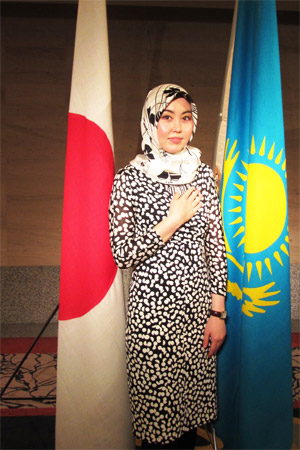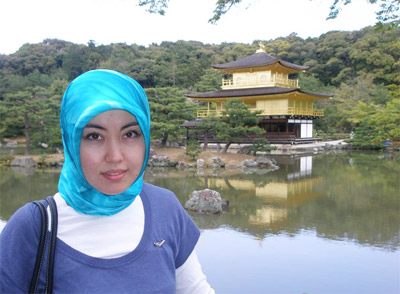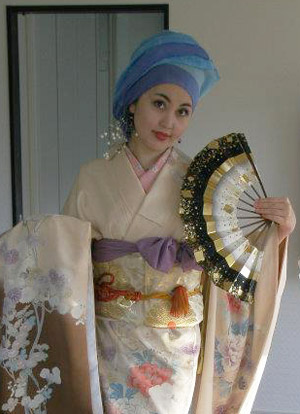Header start
Header start
- Home
- Student Life
- Student Voices
Aisulu Zhussupova (Kazakhstan)
Aisulu Zhussupova (Kazakhstan)
Content start
"Keio University has become my alma mater and family in Japan and I am really proud to learn here."

Aisulu Zhussupova
Home Country: Kazakhstan
Graduate School of Medicine
(Doctoral Program)
Doctoral student of the Keio University Graduate School of Medicine Aisulu Zhussupova came to Japan with the aim of expanding her horizons both professionally and culturally. Aisulu recalls how she became accustomed to carrying out medical research from a background of clinical medicine with the support of professors and fellow researchers at the Keio University Graduate School of Medicine and touches on how her experiences in Japan have allowed her to reflect on the culture of Japan and her home country, Kazakhstan.
How did you find out about your current program and what attracted you to pursue it?
In 2009, during my residency training at the Kazakh Research Institute of Oncology and Radiology, I had a plan to spend a short-term training at a big institution for cancer research abroad. There were two choices: USA or Japan. To make the decision, I discussed with my family and my father suggested that I go to Japan. He told me that I could learn not only medicine and science but also rich Japanese culture.
When I came to the National Cancer Center Hospital in Tokyo I was really impressed by the Japanese medical system and doctors. I had a brilliant time when I started discovering Japan and found it to be a place where I could have a very productive professional and cultural experience. I felt that there was a lot in Japan that I could relate to mentally and emotionally.
After three months training in the Breast Surgery Department, I went back to my home country with the feeling that I wanted to come back.
Please tell us a little bit about your experience of the application process.

I knew Keio University Hospital is very famous for professional and highly qualified specialists and I really wanted to join and learn from them. I came to Keio University School of Medicine Department of Surgery as a research fellow and started breast cancer research. I found that this institution is very advanced and I applied for the Graduate School of Medicine as a doctoral student and started my PhD course from April 2011.
The application period was not so hard because of the support and help of Professor Yuko Kitagawa (Department of Surgery) and doctors from the breast surgery group.
Daily Life
What do you enjoy about life at Keio?
Excellent surgeons and very kind people surround me at Keio University Hospital. I attend several weekly meetings which help to increase my knowledge about basic research and generate further success in our projects, such as a journal club organized by Dr. Tetsu Hayashida, and lab meetings, where we present our research progress reports and receive advice from research supervisors. It is also very interesting for me to learn about breast cancer diagnosis and treatment from the breast surgery group's specialists led by Dr. Hiromitsu Jinno. Weekly morning and evening meetings of the breast surgery group teach us to make decisions on the best treatment tactic for each patient's case, which strictly comply with the novel standards of treatment.
I am very happy to have the chance to learn at Keio University Graduate School of Medicine, being surrounded and supported by the highly-qualified doctors of the Department of General and Gastrointestinal Surgery.
To help international students and trainees to discover Japanese culture and learn and practice Japanese language there are several organizations at Keio University, like Nihongo Club, Keio Welcome Net, and the Tokyo Mita Club. I am enjoying weekly Nihongo Club at Shinanomachi campus, where we can learn and practice Japanese as well as attending some events of Keio Welcome Net and the Tokyo Mita Club.
Challenges
Please tell us about a challenge that you have faced since coming to Keio and how you overcame it.
Before coming to Keio I did only clinical work and was not familiar with basic research experiments so it was difficult for me at first.
I am really grateful to my research mentor, Dr. Tetsu Hayashida, who made his research in Harvard University, for his kind way of teaching and supporting me every time.
Personal impressions

What has been your most memorable experience so far during your time in Japan
After I had been in Japan for just a few months, the big earthquake happened in the Tohoku region, March 11, 2011.
I was able to see how Japanese people patiently and wisely react to such critical situations and how organized they are. Doctors from Keio University Hospital reacted very quickly to help people suffering as a result of the earthquake and tsunami in the Tohoku region from the first week. I was not so scared at the time because of the care of people around me, especially Dr. Maiko Takahashi, female surgeon of the Department of Surgery, who took care of me as if I were a real relative, kindness which I will never forget.
I also want to express my appreciation to the Embassy of Kazakhstan which has been and continues to always be hugely helpful to all our citizens in Japan at that difficult time. From that experience I understood that such strong feelings for one's home country and acting as a big strong family helped Japan to recover so quickly. It is a great example for the entire world.
What are your plans after you finish your studies at Keio? What do you think you will take with you from this experience?
I want to use the knowledge I have obtained at Keio University Hospital in my home country. Returning to clinical medicine I also want to continue basic research because it opens up new ways of treatment for cancer patients. Knowing the detailed mechanisms of cancer helps clinicians to understand cancer development more deeply.
Several cancer and research institutions in Kazakhstan, such as the Kazakh National Research Institute of Oncology in Almaty city and also Nazarbayev University in Astana, opened just a few years ago. It has strong support from our government to develop research in life science, engineering, and other fields and is also planning to open a hospital with a large cancer center.
Our president Nursultan Nazarbayev supports science and young talented specialists. He organized a foundation called "Bolashak," which means "Future," to provide financial support for prospective students to study abroad. There are some students who have already come to Japan under the Bolashak Program. I hope the number of such students will increase year by year and will contribute to the development of science in Kazakhstan.
Advice to international students
How would you recommend Keio to students in your home country?
Keio University is one of the best universities in Japan, well known for its famous professors, strong traditions, and giving high-quality education to its students.
I had the honor of being awarded the Keio University Scholarship for international graduate students, called the "Design the Future" Award, in 2011. For me, Keio University has become my alma mater and family in Japan and I am really proud to learn here. I want to express my gratitude to the University for the opportunity to study here.
(This interview is from December 2012.)


